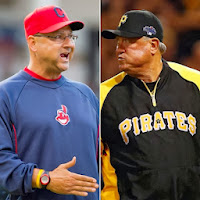McCann greatly improves the Catcher position for the Yankees. According to Bryan Hoch in his article McCann, Yankees agree to five-year deal dated November 24, 2013 from MLB.com:
With general manager Brian Cashman and manager Joe Girardi agreeing to try their defense-first catching alignment, the Yanks' backstops produced an overall line of .213/.289/.298 with only eight home runs and 43 RBIsI believe that level of production from Chris Stewart, Austin Romine and Francisco Cervelli ranked last in the league from the catching position. McCann's slash line in 102 games last season .256/.336/.461 with 20 homeruns and 57 RBIs. The short porch of Yankees stadium would look large for left-handed hitting Brian McCann. His bat is definitely a welcome addition to a Yankees lineup that looked anemic at times last season.
Another positive that I see with signing McCann is the fiery nature that he brings to a team. Sure there are those who have been critical of him with his bench clearing confrontation of Carlos Gomez last season after Gomez hit a homerun against the Braves. I'll be honest, I didn't have the benefit of watching the play live, only on repeated replay. So I can't really comment on that. But I do like his intensity, which is something that I felt the team was lacking the last few seasons. Now for the negatives.
Allow me to go back to the 102 games McCann played last season. McCann's season high in games played was 145 in 2008 and only played in 140 or more games twice in his career while only playing in 128, 121 and 102 games in the seasons 2011-2013. The advantage for McCann is that he can be slotted into the DH position to give his body a rest while not removing his bat from the lineup. McCann has also been quoted as being willing to learn to play first base which could be beneficial to the Yankees with Teixiera being injury prone as of late and with the fact that Teixiera's contract is due to expire in 2016 which is half way through McCann's contract with the Yankees.
The question for McCann is this: Can he stay healthy. Only time will tell that. Another question that I have is how will McCann handle playing in New York City with its incessant media coverage of the good AND bad of a ballplayer's production and playing time. Again, only time will tell that.
I know McCann is a productive, if not a solid player. I should be excited with the signing of a 29-year old Catcher who (in theory) is just entering his prime, productive years. But I just don't have the excitement that some have with the signing. As it is, I was already feeling down on the team with all the talk of signing Carlos Beltran and Jhonny Peralta (who thankfully signed with the Cardinals for 4-years, $52-million dollars). It just doesn't seem that the organization has learned its lessons on trying to put together a team full of veteran all-stars and expecting them to deliver now. I'm in the minority that feels that the team need to sacrifice a year or two and try to rebuild the core through youth. To think of the future, not just the now. But what do I know. I write on blogger and work in a bar. So go figure.
Sisco Kid
For Further Reading
- Click Here to access Brian McCann's career statistics from Baseball Reference.com
- Click Here to read Alex Speier's article Agent B.B. Abbott: Brian McCann Willing to Learn First Base to Increase Playing Time from the WEEI Full Count website dated November 21, 2013
- Click Here to read Joshua Ryan's article 2014 MLB Free Agent Profile: Brian McCann from Amazin' Avenue/SBNation dated October 29, 2013









